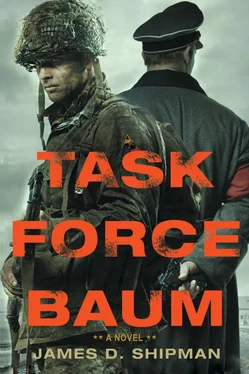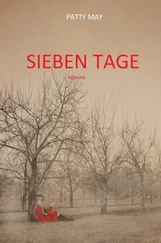“Sure,” said Curtis.
The orderly moved around the cot until he was directly across from the captain. “Put your arm back here,” he directed, placing his own hand behind Hanson’s back. Curtis nodded, mirroring the orderly’s movements. When they both had a firm grip, he pulled up, dragging Hanson upright. “Now hold him,” said the orderly, who reached down and pulled the blanket and sheet back; he drew up a sponge and cleaned the lieutenant’s legs. Curtis was shocked at how withered they’d become. So soon.
Hanson laughed, staring down at his feet. “It’s funny. I’m so surprised to see my legs there. Every damn time. There they are—ankles, knees, thighs—but at the same time, they’re gone forever. What I wouldn’t give to wiggle a toe one more time. Anything. Just a flicker.”
“At least you’ve got ’em,” said Curtis, not sure he was on safe ground. “A lot of boys are missing them entirely.”
“I’d trade both legs if I could still use my…” He looked down at his waist.
Curtis patted him on the shoulder, not knowing what else to say. He helped the orderly move Hanson back down until he was resting again above the pillows. “Don’t think on that right now, my friend. Think about what I told you.”
A few minutes later, Curtis stepped out of the hospital, his breath coming in harsh gasps. He bent over, trying to force the bile back down his throat. He gagged and spat, waiting for the nausea to pass. It never got any easier. In the Ardennes, 140 men had depended on him to protect and guide them. Instead, they’d died or were captured before they’d even had a chance to fight. How many of his men were crippled like Hanson? How many more would never see home? He would never know. His capture had denied him even that.
“Curtis, you okay?” He heard the booming voice of Waters. He reached up and wiped the tears from his face, forcing himself to calm down and face his XO.
“Yes, sir. I’m fine.”
Waters scrutinized him for a moment. He opened his steely eyes as if he would say something, his stern countenance softening. He motioned for the captain to step away from the door and join him.
“What is it?” asked Curtis.
“Bad news.”
Curtis felt a lurch of anxiety. “The rumor was false?”
“Nope. I’d say it’s true. That’s the problem.”
“That can’t be negative, can it?”
“They’re moving us,” said Waters.
“Where?” Curtis felt his stomach churn.
“Who knows. East somewhere. The Kommandant told Goode to expect trains tonight. We’re supposed to line up with all our things by nineteen hundred hours.”
“What do you want me to do?”
“Let the boys in the barracks know.”
“What else? You want me to get things rolling for the evacuation?”
Waters sniffed, considering the suggestion and shook his head. “Sit tight on that. I don’t want us jumping the gun. Once Goode knows it’s a done deal, we’ll start moving things into action. But be prepared. Everyone should make a sack to carry a little food and clothing. Any contraband has to be well hidden or destroyed.”
“How will we deal with the food?”
“Same as liberation. When we know it’s gonna happen, we’ll distribute what we have equally to each barracks, and then split it out among the men. The stronger boys should carry more, but they can’t keep it for themselves. Everything has to be divided up fair.”
“Yes, sir.” A thought occurred to him. “How do we handle the hospital?” he asked.
A strange expression flickered across Waters’s face. “Don’t worry about that, Captain. Focus on your group.”
“Tell me.”
Waters hesitated again. “We don’t deal with them.”
“What?”
“In Poland, we had to leave them behind. Don’t worry, they should be okay. Patton will be here in a few days.”
“Should be?”
“It doesn’t matter.” Waters looked away.
“Say it.”
“At the old camp, we had some rumors. That’s all.”
“What kind of rumors.”
“We heard stories that the Germans at some camps liquidated the wounded.”
“You can’t be serious?”
Waters turned back to him. “Would that really surprise you, Captain. Don’t be naïve. You’ve heard the stories of the Eastern Front. Mass killings. Atrocities everywhere. The krauts don’t play by the rules. This is a different kind of war.”
“It can’t be true.” Curtis said it out of revulsion, rather than conviction.
“Doesn’t matter. True or not, our hands are tied. We can’t take them with us if the Germans won’t let us.”
“Hanson’s in there.”
“Who?” asked the XO.
“Lieutenant Hanson. One of my boys. Platoon commander in my company.”
Waters shook his head. “I’m sorry. I hope the stories are lies. But what can we do? It’s in God’s hands.”
Small comfort, thought Curtis. God had abandoned him long ago.
Near Headquarters, Combat Command B,
4th Division, US Army
Southwest Germany
March 26, 1945, 1600 hours
An icy silence blanketed the jeep ride to 4th Division. Stiller and Hall sat side by side like stone statues, bouncing along the potholed back roads without exchanging a word. They passed miles of forested hills, dotted occasionally by picturesque villages cluttered with gingerbread houses. Hall noted that these little towns, straight out of a fairy tale, were marred here and there by the carnage of war. Windows blown out by bombs and artillery. The whole side of a house missing, the interior floors starkly exposed to the world. After six long years of aggression, war had come home to Germany.
He was glad Stiller was silent. He’d expected a chew-out the whole way. Not that he deserved it. It was the other way around. The major was the one with the problem. Hall rubbed his chin, feeling the coarse hairs and the trademark dimple of his chin. He’d hated it as a boy, but the girls felt otherwise, so he didn’t mind so much now. He smiled to himself, thinking about all those ladies at college. They were so beautiful and innocent. All wanting a husband. He loved the time with them, the compliments and the insults. Always keeping them a little off guard. Filling their empty heads with his promises. They all wanted to be Mrs. Hall. They ended up like these little villages. Still beautiful but with a few scars.
He ached for a drink. Why did that prick have to catch him? When he returned from Patton’s office, he’d hastily tossed his flask in a corner and covered it with a coat. Now he had nothing to sip on. All these months, and nobody’d seen a thing. He’d done his job just fine. The drink helped keep him going. Now the bastard had caught him, and he was out in the field with nothing. Still, these GIs were famous for boozing, weren’t they? He’d read the reports. He should be able to scrounge something up. He just had to get away from the Lone Ranger sitting next to him. That shouldn’t be a problem once they got out on the road with the combat group.
They rounded a corner, and a checkpoint materialized: three GIs with rifles ready and a fourth mounting a thirty-caliber machine gun trained on their vehicle. A sergeant raised his hand and ordered them to stop.
“Who are you?” he asked, when the jeep was close enough.
“Major Stiller with a message for HQ,” explained the driver. He handed some paperwork to the sergeant, who read it and turned to scrutinize Stiller and Hall. Satisfied, he saluted and waved them past. The jeep jolted into motion, and they jingled along the last few hundred yards to the HQ command tent.
Hall followed the major out of the jeep and into the structure. The interior was full of a smoky fog emanating from the cigarettes held in a dozen hands. The men surrounded a card table covered in maps and paperwork. As they entered the tent, the light from outside sprang across the table, and the officers collectively looked up, straining their eyes to see who had entered.
Читать дальше












